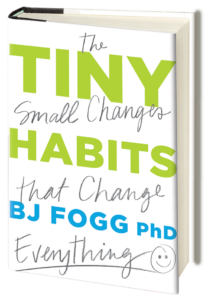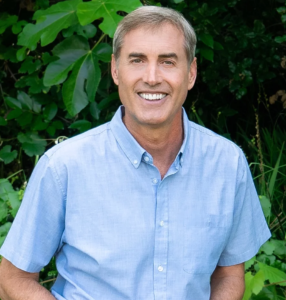The atom, iPhones, Baby Yoda – sometimes a lot of power can come from very small packages. Could the same hold true for decision making? BJ Fogg, PhD, believes tiny daily adjustments can reap massive rewards in our personal and professional lives. But is this force easy to manage? WellWell recently spoke with the author of Tiny Habits: The Small Changes That Change Everything about how making minuscule modifications to established routines can set you up for huge success.
These are genuinely tiny habits that you talk about in the book, for example, you mention doing just two push-ups a day or merely taking one deep breath. How do such small actions help you take large strides towards an end goal?
There are three basic ways. Number one, the things that begin tiny will grow bigger if you start feeling successful. Number two, when you feel successful doing a behavior, it will propagate other related behaviors, like push-ups might lead to crunches, which leads to running and so on. As you continue this habit, however small the actions, you feel successful and you begin thinking: “Oh, I’m the type of person who workouts.” That’s the third and most important aspect, a shift in identity and belief in yourself. 
Is there any risk in setting the bar low?
I think the bigger risk is trying to do too much at once to the point of being overwhelmed. The idea is to start small with a goal that’s more than manageable so that as you gradually increase it, you feel confident you can continue to accomplish it. That’s why it’s so important to celebrate these little victories because it’ll increase your motivation to continue.
In your TED Talk, you state that relying primarily on motivation to change a behavior a losing strategy.
Of course, it takes more than just motivation. In the traditional way of behavioral change, people will take something they feel passionate about and feel motivated at that moment in the beginning. But after that initial excitement, it’ll begin to waiver. Another reason we try to keep it small. The tiny habits program acknowledges the reality that our motivation is going to fluctuate so you make the habit so simple that you don’t have to tap into high levels of motivation.
You’ve worked quite a bit at Stanford’s behavioral design lab with the issue of climate change. How can we apply these tiny habit principles towards a larger scale issue such as combating global warming and climate change?
On a personal level, it’s about figuring out the most effective habits that everyday people can implement to help with climate change. For example, switching from single use plastic water bottles to reusable ones. I made a small habitual change of using one reusable water bottle and now I would never dream of taking a plastic bottle out in the morning or at the office because it’s so fully wired in. I’m not a climate expert, nor are my researchers – we focus on behavior. But one of our goals is to try to help those who are. We train environmental professionals so that they can use the Tiny Habits Method to hopefully develop some larger scale solutions.
Do you think that right now, with so many people stuck at home, is a better time to start implementing some tiny habits or a more difficult time?
Any time’s a good time to create new habits but especially now. Now more than ever. The Tiny Habits Method is especially appropriate when people are stressed out or feeling discouraged so it’s perfect for this moment. It’ll also help people stay organized and productive. If they’re looking to build a new skill with all this extra time, it’s perfect. I’ve learned two musical instruments, Hawaiian, and even cartoon captioning using the method through all this.
Do you think using the method to learn something new could help someone become more positive and less drained by all the terrible things going?
The whole concept of tiny habits is attaching a new habit to an older already established, often menial, activity. A lot of people, now more than ever, may feel like days are becoming repetitive and redundant so you may be surprised with how quickly a habit can develop into a real accomplishment. And I think accomplishing a goal is a very powerful experience.

About BJ Fogg, PhD
BJ Fogg, PhD, founded the Behavior Design Lab at Stanford University. In addition to his research, Fogg teaches industry innovators how human behavior really works. He created the Tiny Habits Academy to help people around the world. He lives in Northern California and Maui.
Find out more at BJFogg.com and visit TinyHabits.com to learn about his New York Times bestselling book, Tiny Habits: The Small Changes that Change Everything.













